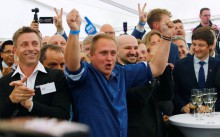On September 4, the state of Mecklenburg-Vorpommern, located in northwestern Germany, held the election for the local parliament. It unexpectedly saw the Christian Democratic Union (CDU), which is the party of German Chancellor Angela Merkel, falling to the third place with 19 percent of the vote, thus losing to the right-wing populist anti-immigrant party Alternative for Germany (AfD), which won 21 percent of the vote. The overall winner in the election was the center-left Social Democratic Party of Germany with 30 percent of the vote. However, all the parties that won seats in the state parliament, including the Left Party which received 13 percent of the vote, have ruled out cooperating and entering into coalition with the right-wing populist AfD.
The Mecklenburg legislative election was widely seen as the crucial test before the general election to be held in Germany in 2017. Thus, observers are pointing out that major electoral support enjoyed by the AfD may weaken the position of chancellor Merkel, who has become a target of criticism for her decision to “open the door” to Europe to millions of refugees, taken precisely a year ago.
Nonetheless, while attending the G20 summit in China, Merkel gave an interview to Bild and rejected accusations that the refugee crisis undermined the social security guarantees enjoyed by the Germans. In particular, she emphasized: “The German government is not going to cut anybody’s benefits in Germany because of the refugee aid… In doing so, we did not take anything away from anybody in this country. We are still fulfilling the task of politics to maintain the quality of life of the people in Germany and to improve it.”
Meanwhile, the AfD’s leader Leif-Erik Holm said: “We may be seeing the beginning of the end of Merkel’s stay as chancellor.”
Merkel’s party’s poor showing in the election rattled world media. The BBC writes that Merkel’s defeat in Mecklenburg was particularly humiliating for her because it was her home turf. Moreover, it is clear that after such a result, the public’s demands for government to review its policy on illegal immigrants will only get louder.
The DW notes that the defeat in regional elections has subjected Merkel to criticism by politicians from her own party as well.
“The strong performance of the AfD is a bitter result for many in our party. A sizable number of people showed the desire to exercise their protest, and we have seen it especially in regards to national migration policies,” said general secretary of the CDU Peter Tauber.
General secretary of the Christian Social Union (the CDU’s Bavarian ally) Andreas Scheuer said that after the “devastating” results of the election, the government in Berlin needed to take “tough decisions.” “We cannot simply give in and watch how a party built on attracting protest voters profits from the failures of the federal government in Berlin,” he stressed. Meanwhile, the Bavarian party’s spokesman Stephan Mayer told Huffington Post that he saw the results of the election as a “disaster” brought about by Merkel’s policy on refugees.
According to Bavarian Finance Minister Markus Soeder, the result of the Mecklenburg election should become a wake-up call forcing Merkel to take a tougher stance on immigrants.
Meanwhile, a CNN comment noted that “experts say the results do not mean there is a looming disaster for Merkel in next year’s election if she chooses to run – the AfD would likely have trouble forming a coalition with more traditional political parties – but do signal some concerns for Merkel.”
“THIS IS A HORRIBLE EXPERIENCE FOR THE CDU, WHO NOW FACE SERIOUS COMPETITION TO THEIR RIGHT FOR THE FIRST TIME”
Gerhard GNAUCK, correspondent, Die Welt, Germany:
“The half, if not more, of the AfD’s success is the result of the migration crisis. The AfD first made its mark riding the wave of discontent caused by the ‘rescue’ of Greece, which took billions after billions in aid. It has radicalized since, though. On the other hand, while the far-right National Democratic Party of Germany, which failed to win any seats in the parliament on September 4, can be labeled as anti-democratic, the AfD is a more complicated case. Unfortunately, one of the party’s leaders, Alexander Gauland, is clearly pro-Putin, and he has shown it, including by speaking on the issue of Crimea.
“All of this is a horrible experience for the CDU, who now face serious competition to their right for the first time. Still, the AfD will not get into the government of Mecklenburg-Vorpommern this time, which is good.”







